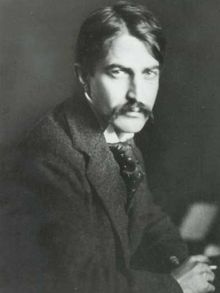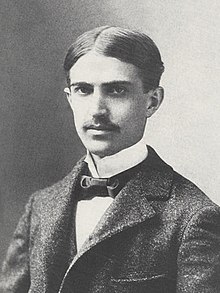Stephen Crane
(Redirected from Crane, Stephen)

Scorn hits strong because of a lie;
Yet there exists a mystic tie.
Unwind my riddle.
Stephen Crane (1 November 1871 – 5 June 1900) was an American novelist, poet and journalist.
Quotes[edit]

- Every sin is the result of a collaboration.
- "The Blue Hotel", from The Monster and Other Stories (1898)
- Unwind my riddle.
Cruel as hawks the hours fly;
Wounded men seldom come home to die;
The hard waves see an arm flung high;
Scorn hits strong because of a lie;
Yet there exists a mystic tie.
Unwind my riddle.- Epigraph in "The Clan of No Name" (1899); published in the anthology Wounds in the Rain (1900)
- The word is clear only to the kind who on peak or plain, from dark northern ice-fields to the hot wet jungles, through all wine and want, through lies and unfamiliar truth, dark or light, are governed by the unknown gods, and though each man knows the law, no man may give tongue to it.
- "The Clan of No Name" (1899); published in the anthology Wounds in the Rain (1900)
The Open Boat (1894)[edit]

- First published in Scribner's Magazine, issue 21 (May 1894)
- None of them knew the color of the sky. Their eyes glanced level, and were fastened upon the waves that swept toward them. These waves were of the hue of slate, save for the tops, which were of foaming white, and all of the men knew the colors of the sea. The horizon narrowed and widened, and dipped and rose, and at all times its edge was jagged with waves that seemed thrust up in points like rocks.
- Pt. I
- A singular disadvantage of the sea lies in the fact that after successfully surmounting one wave you discover that there is another behind it just as important and just as nervously anxious to do something effective in the way of swamping boats.
- Pt. I
- It would be difficult to describe the subtle brotherhood of men that was here established on the seas. No one said that it was so. No one mentioned it. But it dwelt in the boat, and each man felt it warm him. They were a captain, an oiler, a cook, and a correspondent, and they were friends, friends in a more curiously iron-bound degree than may be common. The hurt captain, lying against the water-jar in the bow, spoke always in a low voice and calmly, but he could never command a more ready and swiftly obedient crew than the motley three of the dingey. It was more than a mere recognition of what was best for the common safety. There was surely in it a quality that was personal and heartfelt. And after this devotion to the commander of the boat there was this comradeship that the correspondent, for instance, who had been taught to be cynical of men, knew even at the time was the best experience of his life. But no one said that it was so. No one mentioned it.
- Pt. III
- When one exchanged the rowing-seat for a place in the bottom of the boat, he suffered a bodily depression that caused him to be careless of everything save an obligation to wiggle one finger. There was cold sea-water swashing to and fro in the boat, and he lay in it. His head, pillowed on a thwart, was within an inch of the swirl of a wave crest, and sometimes a particularly obstreperous sea came in-board and drenched him once more. But these matters did not annoy him. It is almost certain that if the boat had capsized he would have tumbled comfortably out upon the ocean as if he felt sure it was a great soft mattress.
- Pt. IV
- If I am going to be drowned — if I am going to be drowned — if I am going to be drowned, why, in the name of the seven mad gods, who rule the sea, was I allowed to come thus far and contemplate sand and trees?
- Pt. VI
- When it occurs to a man that nature does not regard him as important, and that she feels she would not maim the universe by disposing of him, he at first wishes to throw bricks at the temple, and he hates deeply the fact that there are no bricks and no temples. Any visible expression of nature would surely be pelleted with his jeers. Then, if there be no tangible thing to hoot he feels, perhaps, the desire to confront a personification and indulge in pleas, bowed to one knee, and with hands supplicant, saying: "Yes, but I love myself." A high cold star on a winter's night is the word he feels that she says to him. Thereafter he knows the pathos of his situation.
- Pt. VI
- When it came night, the white waves paced to and fro in the moonlight, and the wind brought the sound of the great sea's voice to the men on shore, and they felt that they could then be interpreters.
- Pt. VII
The Red Badge of Courage (1895)[edit]

- The cold passed reluctantly from the earth, and the retiring fogs revealed an army stretched out on the hills, resting. As the landscape changed from brown to green, the army awakened, and began to tremble with eagerness at the noise of rumors.
- Ch. 1 First lines.
- The line, broken into moving fragments by the ground, went calmly on through fields and woods. The youth looked at the men nearest him, and saw, for the most part, expressions of deep interest, as if they were investigating something that had fascinated them. One or two stepped with overvaliant airs as if they were already plunged into war. Others walked as upon thin ice. The greater part of the untested men appeared quiet and absorbed. They were going to look at war, the red animal — war, the blood-swollen god. And they were deeply engrossed in this march.
- Ch. 3
- It was surprising that Nature had gone tranquilly on with her golden process in the midst of so much devilment.
- Ch. 5
- At times he regarded the wounded soldiers in an envious way. He conceived persons with torn bodies to be peculiarly happy. He wished that he, too, had a wound, a red badge of courage.
- Ch. 9
- The red sun was pasted in the sky like a wafer.
- Ch. 9
- He had fought like a pagan who defends his religion.
- Ch. 17
- He had been to touch the great death, and found that, after all, it was but the great death. He was a man.
- Ch. 24
- It rained. The procession of weary soldiers became a bedraggled train, despondent and muttering, marching with churning effort in a trough of liquid brown mud under a low, wretched sky. Yet the youth smiled, for he saw that the world was a world for him, though many discovered it to be made of oaths and walking sticks. He had rid himself of the red sickness of battle. The sultry nightmare was in the past. He had been an animal blistered and sweating in the heat and pain of war. He turned now with a lover's thirst to images of tranquil skies, fresh meadows, cool brooks — an existence of soft and eternal peace.
Over the river a golden ray of sun came through the hosts of leaden rain clouds.- Ch. 24
The Black Riders and Other Lines (1895)[edit]

To my tiny throes and struggles,
He sees a fool;
And it is not fine for gods to menace fools.

A breath, a wind,
A shadow, a phantom,
And never had I touched
The hem of its garment.
- In the desert
I saw a creature, naked, bestial,
Who, squatting upon the ground,
Held his heart in his hands,
And ate of it.
I said, "Is it good, friend?"
"It is bitter—bitter," he answered;
"But I like it
Because it is bitter,
And because it is my heart."- III
- If there is a witness to my little life,
To my tiny throes and struggles,
He sees a fool;
And it is not fine for gods to menace fools.- XIII
I saw a man pursuing the horizon;
Round and round they sped.
I was disturbed at this;
I accosted the man.
"It is futile," I said,
"You can never—""You lie," he cried,
And ran on.- XXIV
"Truth," said a traveller,
"Is a rock, a mighty fortress;
"Often have I been to it,
"Even to its highest tower,
"From whence the world looks black.""Truth," said a traveller,
And I believed the second traveller;
"Is a breath, a wind,
"A shadow, a phantom;
"Long have I pursued it,
"But never have I touched
"The hem of its garment."
For truth was to me
A breath, a wind,
A shadow, a phantom,
And never had I touched
The hem of its garment.- XXVIII
War Is Kind and Other Lines (1899)[edit]

Perceiving the pathway to truth,
Was struck with astonishment.
It was thickly grown with weeds.

"Sir I exist!"
"However," replied the universe,
"The fact has not created in me
A sense of obligation."
- Do not weep, maiden, for war is kind.
Because your lover threw wild hands toward the sky
And the affrighted steed ran on alone,
Do not weep.
War is kind.- Do Not Weep, Maiden, For War is Kind, No. 1, st. 1
- Hoarse, booming drums of the regiment,
Little souls who thirst for fight,
These men were born to drill and die.
The unexplained glory flies above them,
Great is the battle-god, great, and his kingdom —
A field where a thousand corpses lie.- Do Not Weep, Maiden, For War is Kind, st. 2
- Do not weep, babe, for war is kind.
Because your father tumbled in the yellow trenches,
Raged at his breast, gulped and died,
Do not weep.
War is kind.- Do Not Weep, Maiden, For War is Kind, st. 3
- Swift blazing flag of the regiment,
Eagle with crest of red and gold,
These men were born to drill and die.
Point for them the virtue of slaughter,
Make plain to them the excellence of killing
And a field where a thousand corpses lie.- Do Not Weep, Maiden, For War is Kind, st. 4
- The wayfarer,
Perceiving the pathway to truth,
Was struck with astonishment.
It was thickly grown with weeds.
"Ha," he said,
"I see that none has passed here
In a long time."
Later he saw that each weed
Was a singular knife.
"Well," he mumbled at last,
"Doubtless there are other roads."- The Wayfarer, No. 13
- A man said to the universe:
"Sir I exist!"
"However," replied the universe,
"The fact has not created in me
A sense of obligation."- A Man Said to the Universe, No. 20
Misattributed[edit]
- You cannot choose your battlefield,
God does that for you;
But you can plant a standard
Where a standard never flew.- The Colors by Nathalia Crane
Quotes about Stephen Crane[edit]
- Roving was good for the writer; to have been a reporter undoubtedly informed Ring Lardner, Ernest Hemingway, Stephen Crane. To know far more than he may ever use is imperative for the writer.
- Josephine Herbst "The Ruins of Memory" (April 4, 1956) in The Nation
External links[edit]
- Brief biography at Kirjasto (Pegasos)
- The Stephen Crane Society
- Online Books Page (University of Pennsylvania)
- Works by Stephen Crane at Project Gutenberg
- Poems by Stephen Crane at PoetryFoundation.org
- Literary Encyclopedia
- The short story A Dark Brown Dog can be read online at American Literature
- The Black Riders and Other Lines (1895)
- War is Kind and Other Lines (1899)


